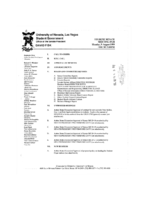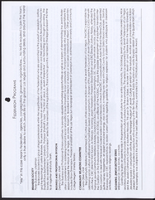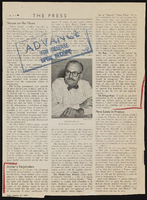Search the Special Collections and Archives Portal
Search Results

Meeting minutes for Consolidated Student Senate University of Nevada, Las Vegas, August 9, 1999
Date
Archival Collection
Description
Text

Lisa Song Sutton oral history interview: transcript
Date
Archival Collection
Description
Oral history interview with Lisa Song Sutton conducted by Cecilia Winchell, Vanessa Concepcion, and Stefani Evans on November 19, 2021 for Reflections: The Las Vegas Asian American and Pacific Islander Oral History Project. Lisa shares her personal history and childhood memories moving from Seoul, South Korea to Sierra Vista, Arizona at the age of five. She discusses her educational and professional pursuits in business litigation, bankruptcy law, entrepreneurship, modeling, and her time in the pageant circuit winning Miss Vegas and Miss Nevada in 2013. Lisa also talks about her activism and community engagement efforts to empower women within Las Vegas. She concludes her interview with insight into her Korean heritage, traditional celebrations, and religion.
Text
Frost, Florence, 1929-
Florence Frost was born March 24, 1929 in Brooklyn, New York. She married Robert L. Frost in 1949 and had three daughters. Not long after she moved from New York City to Las Vegas, Nevada in 1960, she joined Temple Beth Sholom, where she worked as an executive secretary for two years. Frost worked in the banking industry for many years before she earned her broker's license in 1974. That same year, she opened her own real estate office in Las Vegas, Rancho Rodeo Realty, which she owned until 2004.
Person

Transcript of interview with Jackie Boiman by Barbara Tabach, March 27, 2015
Date
Archival Collection
Description
Jackie, n?e Brooks, Boiman was born in Brooklyn and raised in Levittown, New York. Although Jackie recalls her family?s Jewish observance as far less than strict, her religious connection began in the Levittown Jewish Center Sunday School and under the close relationship she had with her grandmother, who kept kosher and inspired her to do so. In her early twenties, Jackie worked in data reduction at Grumman Aerospace Corporation and the space program; was married and had her only child, Andee. After twelve years of marriage, Jackie divorced and relocated to Las Vegas, where her parents had moved earlier. In Las Vegas, job opportunities for a single mother were scant. Then after months of searching, she found her first job as a part time secretary for Temple Beth Sholom. Over the course of the next nearly fifteen years, Jackie would go on to work with almost every congregation and temple in Las Vegas, developing their youth programs and contributing to the growth of each one for 15 years. After a brief retirement, she had gone back to work as the first administration person for Touro University. In this interview, Jackie discusses at length her involvement with each of the temples, her experiences with being a single mother and living below the poverty line. She shares how her life has been changed through trials and tribulations but how her faithfulness and commitment to her mission had led her to the success she has today.
Text

Anita Tijerina Revilla oral history interview: transcript
Date
Archival Collection
Description
Oral history interview with Anita Tijerina Revilla conducted by Marcela Rodriguez-Campo on October 09, 2018 for the Latinx Voices of Southern Nevada Oral History Project. In this interview, Revilla discusses her early life in San Antonio, Texas. She talks about her decision to make education a priority, figuring out the college application process on her own, and her initial interest in social justice. Revilla talks about how her critical consciousness was developed, and her pedagogical approach to teaching. Revilla describes her role in the 2006 May Day march, advocating advocating for the queer community, and disrupting oppressive systems to increase educational access for students. Lastly, Revilla discusses ethnic studies and the history of inequality in the United States.
Text



